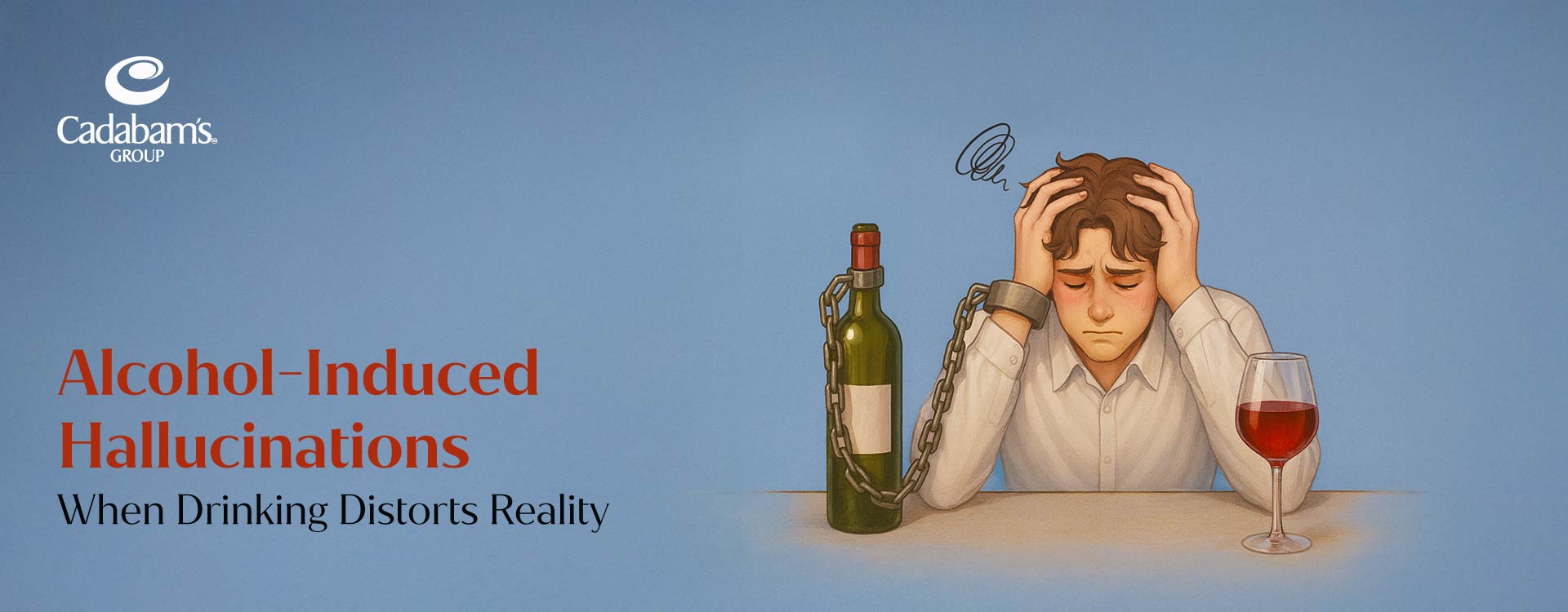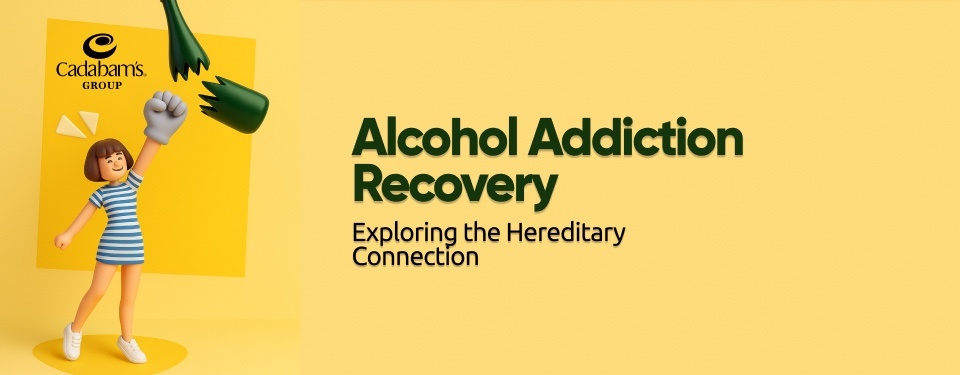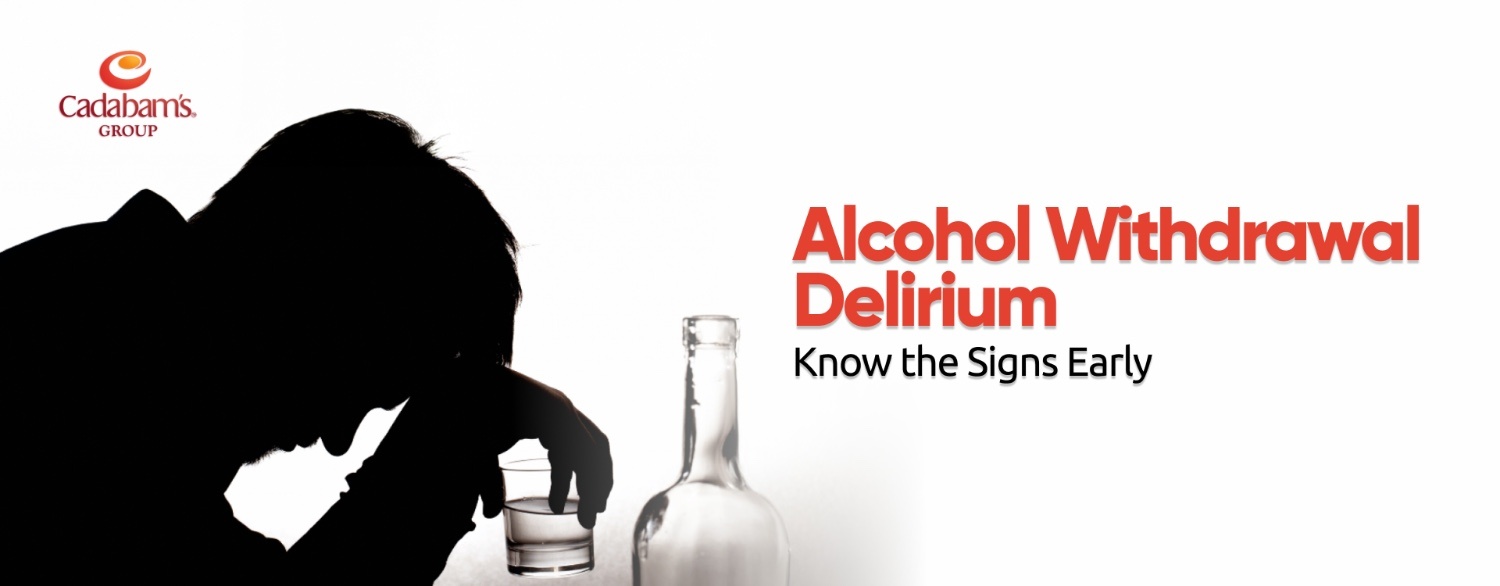Alcohol hallucinations with alcohol represent one of the severe consequences arising either from alcohol abuse or its withdrawal. This type of psychotic episode can present auditory, visual, or tactile perceptions not based on reality. Studies have shown that alcohol hallucinations is the second among psychoses due to alcohol use after delirium tremens, which affects many people who go through chronic disorders, including alcohol intake.
This blog helps prevent and manage the condition of alcohol-induced hallucinations among individuals with alcohol use disorder. It is vital to understand mechanisms, risk factors, and treatment options for alcohol-induced hallucinations.
Can Alcohol Cause Hallucinations?
People often go through this question: Does alcohol cause hallucinations? Alcohol can indeed cause hallucinations, particularly in individuals with chronic alcohol use disorder. The state is known as alcoholic hallucinosis, which usually occurs either during the acute intoxication or alcohol withdrawal periods. This can be both auditory and visual and usually appears after 12-24 hours since alcohol was discontinued and lasts days, typically the voices being menacing or accusatory. Heavy and frequent alcohol consumption can significantly alter brain chemistry, thus leading to psychotic and alcohol hallucinations symptoms.
Mechanisms Behind Alcohol-Induced Hallucinations
Alcohol hallucinations have neurochemical alterations, primarily in the dopamine and serotonin pathways within the brain. Alteration of these neurotransmitter systems through alcohol affects perception, with hallucination and increased activity in the dopaminergic system often involved.
Factors Influencing Hallucination Occurrence
Several factors, such as individual sensitivity to the effects of alcohol, history of substance use, and pre-existing mental health conditions, determine the risk of alcohol hallucinations. Besides, biological and psychosocial variables determine susceptibility. Some factors that may influence the likelihood of hallucinations due to alcohol consumption include:
- Quantity and rate of alcohol intake
- Individual tolerance and sensitivity to alcohol
- Comorbid psychiatric disorders
- Hereditary risks
Alcohol Withdrawal and Hallucinations
Alcohol withdrawal syndrome (AWS) is the withdrawal stage during heavy drinking stoppage that is commonly associated with hallucinations. AWS involves several symptoms, which can begin when someone who has drunk heavily significantly reduces or cuts alcohol use. The signs and symptoms range from mild anxiety to severe medical complications like seizures and delirium tremens.
Understanding Alcohol Withdrawal Syndrome (AWS)
AWS involves several symptoms, which can begin when someone who has drunk heavily significantly reduces or cuts alcohol use. The signs and symptoms range from mild anxiety to severe medical complications like seizures and delirium tremens. Among these symptoms, alcohol withdrawal hallucinations are especially troubling due to their impact on cognition and emotional health.
Hallucinations as a Symptom of AWS
Hallucinations are especially prevalent in AWS and usually manifest within 12-48 hours after the last drink. They are primarily auditory. These alcohol withdrawal hallucinations can be very devastating to the individual's cognitive and emotional well-being, thus requiring immediate medical attention.
Absinthe and Its Association with Hallucinations
Absinthe has been associated with hallucinogenic effects for a long time, primarily because of the high levels of thujone contained, which is extracted from wormwood.
Historical Context of Absinthe and Hallucinations
Throughout the 19th century, absinthe is identified to be responsible for such maladies as psychosis and violent behaviour on the grounds of its psychoactivity. It led to a rash of bans and persistent stigma.
Modern Understanding of Absinthe's Effects
Studies suggest that while absinthe alcohol hallucinations can cause intoxication similar to other alcoholic beverages, the specific hallucinogenic properties attributed to it have been largely exaggerated. The effects are primarily due to its high alcohol content rather than any unique psychoactive properties.
Types of Hallucinations Induced by Alcohol
Alcohol results in various types of hallucinations, including visual, auditory, as well as tactile hallucinations.
Visual Hallucinations
Visual hallucinations occur as brilliant images or distorted perceptions that can occur during alcohol withdrawal and hallucinations or episodes of acute drinking.
Auditory Hallucinations
Auditory hallucinations consist of hearing sounds or voices that do not exist. They are a classic feature of alcohol withdrawal hallucinations and can lead to confusion and increased anxiety.
Tactile Hallucinations
Tactile hallucinations are the perception that a creature is crawling on somebody's skin or the touch of something that is not occurring in reality.
Risk Factors for Developing Alcohol-Induced Hallucinations
There are risk factors that predispose an individual to develop alcohol-induced hallucinations, hence the need for awareness as well as management strategies to curb it.
Chronic Alcohol Use
Long-lasting alcohol abuse leads to steady neurochemical changes that affect the functioning of the brain and significantly increase the chances of alcohol hallucinations.
Co-occurring Mental Health Disorders
People with pre-existing mental illnesses, for example, anxiety or depression, are more vulnerable to alcohol hallucinations and psychosis.
Genetic Predispositions
Genetic predisposition may also play a role in the susceptibility to alcohol use disorders, alcohol withdrawal and hallucinations. Some of the risk factors include a family history of schizophrenia or other psychotic disorders.
Management and Treatment of Alcohol-Induced Hallucinations
Alcohol-induced hallucinations require multidimensional medical, psychological, and lifestyle interventions.
Medical Interventions
Medical interventions playing a role in management are generally effective with benzodiazepines and antipsychotic drugs that stabilise symptoms in acute episodes. Another method which is advised to individuals is detoxification, which should be supervised for those undergoing alcohol withdrawal hallucinations.
Psychological Therapies
Psychological therapies like CBT are one of the therapies that help in managing symptoms and dealing with problems related to alcohol use, alcohol withdrawal and hallucinations. Our assistance towards lifestyle changes and support systems are integral to the treatment process.
Lifestyle Modifications and Support Systems
Our ongoing support from the peer group community resources can strengthen recovery while providing ways not to relapse from the symptoms again.
Managing Alcohol-Induced Hallucinations at Cadabam's Anunitha
At Cadabam's Anunitha, we provide tailored support for individuals experiencing alcohol-induced hallucinations and alcohol withdrawal hallucinations. Our integrated care approach ensures the psychological, medical, and social needs of each individual are well taken care of; hence, proper management of alcohol-induced hallucinations and assistance of recovery. Our continuous support and therapeutic engagement help people regain their well-being and prevent future episodes of psychosis.
If you are searching for a solution to your problem, Cadabam’s Anunitha’s De-Addiction Centre can help you with its team of specialised experts. We have been helping thousands of people live healthier and happier lives for 30+ years. We leverage evidence-based approaches and holistic treatment methods to help individuals effectively overcome Addiction. Get in touch with us today. You can call us at +91 96111 94949.
FAQs
What causes alcoholic hallucinations?
Alcohol hallucinations are due to excessive alcohol consumption that disturbs the brain chemistry, mainly neurotransmitters such as dopamine and serotonin. This often leads to visual, auditory, or even tactile hallucinations, especially in cases of withdrawal or chronic alcohol consumption.
What is the most common alcohol hallucination?
The most common alcohol hallucinations is a visual hallucination. These range from simple, fleeting images to more complex and vivid scenes, which often arise due to alcohol withdrawal and hallucinations from heavy alcohol use.
What types of hallucinations are associated with alcohol withdrawal?
Alcohol withdrawal hallucinations may be visual, auditory, or tactile. Visual hallucinations are the most common, but individuals may also hear non-existent sounds or feel sensations, such as bugs crawling on their skin, during withdrawal episodes.
.webp)






